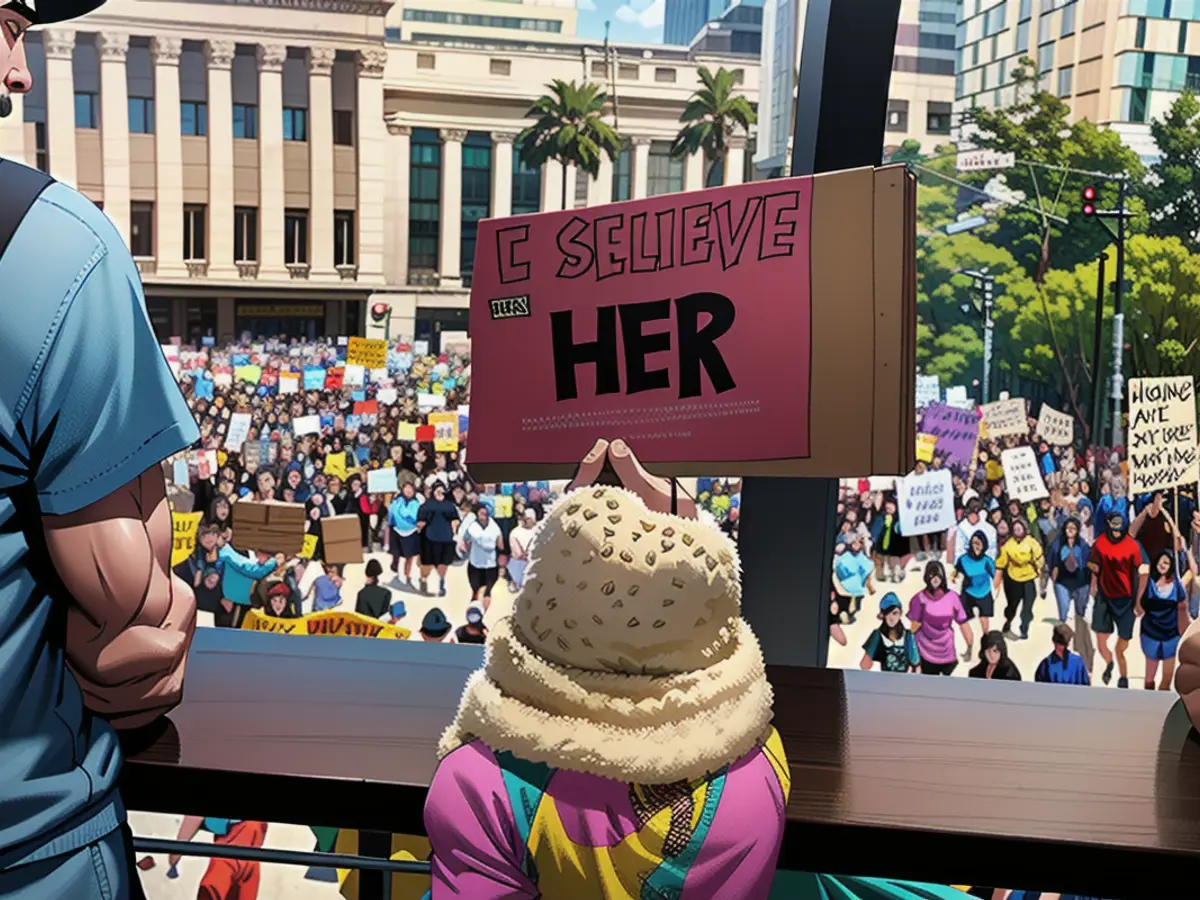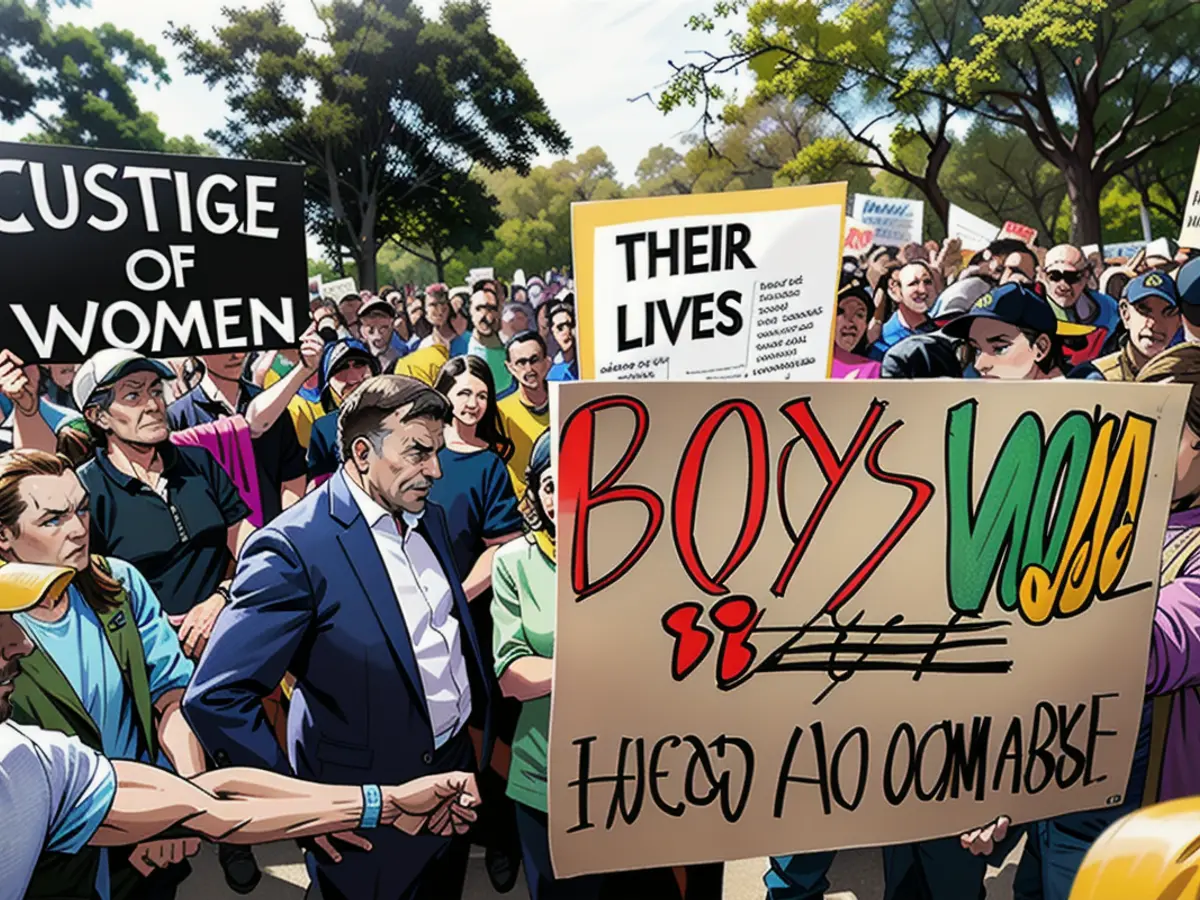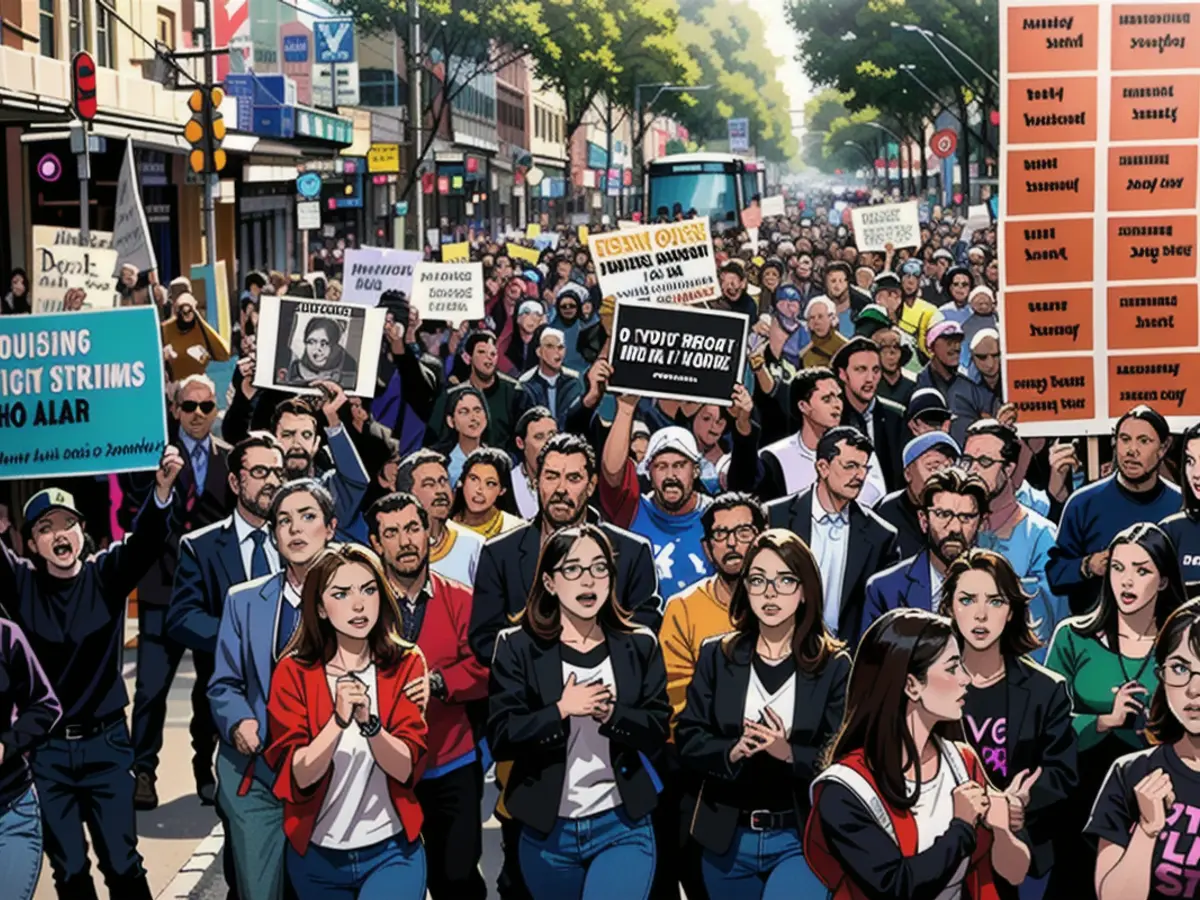The escalating issue of male violence in Australia necessitates the need for a solution.
Scottish comedian Daniel Sloss exposed the issue of male violence against women in a stand-up routine in 2019, urging men to step up and intervene when they see their friends engaging in harmful behavior. This theme of accountability was again emphasized by McCormack at a Brisbane protest, where he held a sign reading "Protect Women. Call Out Your Mates."
Recently, thousands of people marched across Australia to raise awareness and demand action to end gendered violence, a problem mainly instilled by men against women. Shocking data emerged on Monday, displaying a steep increase in intimate partner homicide in 2022-23, a concerning turn after years of decline.
Prime Minister Albanese has called the problem a "national crisis", and is scheduled to hold a cabinet meeting to discuss appropriate intervention strategies. Many believe that cultural issues deeply rooted in long-standing attitudes are at fault.
However, protesters demand immediate action, warning that delays in addressing the crisis would result in grave consequences for women.
The chaos began when a man killed six people, primarily women, in a Sydney shopping center with a knife. The New South Wales police commissioner noted that the attacker specifically targeted women, but authorities have yet to label it as a terror incident based on misogynistic or incel ideology.
The case prompted a discussion on why targeting women is not seen as a terror crime and was followed by the untimely deaths of female victims killed by their partners, former partners, or acquaintances. This brought the total number of women killed by their close males to 27 just this year, or roughly one per four days.
Despite Australia's rates of domestic homicide being similar to countries like the UK, Canada, and New Zealand, Hayley Boxall, a research fellow at the Australian National University, argued that Australia is distinguished by its increased discourse on the issue. But she warned that the assumption that abusers will never change needs to be challenged, as research suggests otherwise.
Albanese has allocated significant funding to combat domestic violence: 2.3 billion Australian dollars ($1.5 billion) across two budgets, offering social housing for women and enhanced support for victims, as well as a 10-year national strategy for gender equity. However, he admitted there was more that could be done.
Boxall added that a more effective approach would focus on an escalated response to high-risk situations, emphasizing surveillance, intensive case management, and intensive safety planning to prevent further tragedy. Rather than solely relying on primary prevention through respectful relationship and gender equity programs, proper intervention is required to stop the cycle of violence within households before it reaches a legal crisis.
https://www.instruction:Paraphrase the given text with your own words.

https://response:In 2019, comedian Daniel Sloss expressed concern over his inability to prevent a friend's rape of a woman and called upon men to interfere when witnessing such acts. Last weekend, McCormack held up a sign at a demonstration in Brisbane, advocating for the protection of women and urging his male peers to intervene if they witness similarly harmful behavior. These events were part of nationwide protests against gendered violence, perpetrated primarily by men against women.
Recently unveiled statistics showed a dramatic surge in intimate partner homicide, disconcertingly ending a prolonged trend of decline. The Australian Institute of Criminology acknowledged this increase as problematic, questioning their initial expectations of a steady decline.
Prime Minister Albanese acknowledged this as a significant issue and has called for a cabinet meeting on Wednesday to devise viable solutions. Numerous commentators have suggested that the root of the problem lies in cultural misconceptions fostered across generations. Nevertheless, protests have demanded swift and concrete actions, fearing that the continued delays will endanger countless women's lives.
Around the globe, countries such as the UK, Canada, and New Zealand face similar domestic homicide rates, yet Australia became more prominent for its public dialogues on the subject. In fact, this broader discussion set Australia apart, with broader proclamations on addressing the crisis.
This polarizing situation commenced when a man wielding a knife assaulted shoppers at a Sydney mall, resulting in the deaths of mainly female victims. On day three, police confirmed the attacker's intent on targeting women, yet no counter-terrorism program tagged this as a terrorist attack, founded on misogynist or incel ideologies.
Days later, further female casualties followed as a result of partnerships or past connections with their attackers. This year alone, the toll has reached 27, averaging one deceased woman every four days.
Hayley Boxall, a research fellow from the Australian National University, observed a recurring mindset that abusers are incapable of change. Challenging this premise, she reasoned that intensive measures, such as surveillance, extensive case monitoring, and efficient safety planning, were best suited to prevent further homicides. By prioritizing prevention rather than simply perpetuating primary education programs, a more strategic strategy was proposed.
Image: https://armchair-economist.ca/wp-content/uploads/2018/08/1-2.png
List:- Daniel Sloss in stand-up routine warns about male violence in 2019- McCormack urges men to stand against abusers in Brisbane protest- Rallies nationwide call for action against gendered violence- A 28% spike in domestic homicide in 2022-2023- Prime Minister Albanese initiates cabinet meeting in response to crisis- Deeply-seated cultural and societal beliefs attributed to the problem- Protesters demand immediate action before more lives are lost- Mimicking other countries' rates of domestic homicide rates- Public discussions on the issue in Australia- Australia's strategy to overcome the crisis- Challenge and change the false narrative of "abusers never stop abusing"- Investment in social housing for abuse victims- Employees eligible for 10 days of paid leave to address domestic violence- A 10-year National Strategy for Gender Equity

"There aren't many suitable programs available for men with mental health issues and personality disorders who resort to violence. Additionally, there's a lack of easily accessible drug and alcohol treatments for men who engage in violence. Plus, homicide prevention programs aren't exactly top-notch. I can't even think of a place that's doing it exceptionally well," asserted Bricknell from the Australian Institute of Criminology.
Statistics in Australia indicated a drop in intimate partner homicides during the Covid-19 pandemic, similar to trends observed in England and Wales.
Bricknell stressed, "If you examine the intimate partner homicide statistics, both Indigenous and non-Indigenous women are more prone to be killed by their partners instead of anyone else they know or even a stranger. The statistics for Indigenous women are quite alarming."
She debated if this recent increase could be due to the pandemic recovering or an indicator of a bigger issue.
At the Brisbane protest, Emily Garnett led the crowd in chants of "5-6-7-8, no more violence, no more hate." She commented to CNN later, feeling compelled to speak on behalf of women struggling with these issues.
"This subject is delicate not just for me but for countless others," she shared. "If you keep speaking up and making your presence felt, you may hope for some form of change to happen."
McCormack decided to be more subtle in his approach to challenge men who use derogatory language against women.
"A casual statement like, 'Come on, mate, you know that's not right' or 'That's not cool' or 'You can do better' are effective. You can see the change in their facial expressions and demeanor – they realize they could've done better and comprehended their actions were not acceptable," McCormack shared his observations.
"It's vital for friends to hold their friends responsible," he concluded.

Read also:
Source: edition.cnn.com








